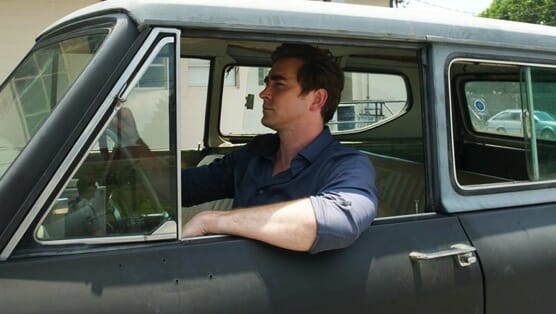Halt & Catch Fire: “Heaven is a Place”
(Episode 2.10)

“Heaven is a place where nothing ever happens.”—Talking Heads, “Heaven”
It’s fitting that the Season Two finale of Halt & Catch Fire takes its namesake from this famed Talking Heads song, as this David Byrne/Jerry Harrison composition about finding beauty and contentment in ennui perfectly embodies the essence of the season’s final installment. Like the song, “Heaven is a Place” marks a period of reflection and reconstruction following the proverbial wrecking ball that was last week’s “Kali” (if we’re really stretching the comparisons here, the song’s placement on Fear of Music also comes as a palate cleanser, after the frenzied momentum of tracks like “Cities” and “Life in Wartime,” so there’s food for thought). Adopting the model most commonly associated with Game of Thrones or The Sopranos, Halt’s penultimate episode signaled the season’s massive game-changer while the actual finale emerges as a means of dealing with the widespread ramifications of the previous hour. As such, “Heaven is a Place” is not the barnburner that “Kali” was. That’s also why “Heaven” is the perfect companion—it may not be “Life During Wartime,” but there’s something to be said for its quiet brilliance.
Then again, maybe the creative team just meant that “heaven is a place on earth” and I’m underestimating the appeal of Belinda Carlisle (given the Talking Heads song soundtracks the hour’s final moments, however, I’m sticking with that train of thought).
Predictably, the episode opens with the world in disarray. As a result of the Sonaris infestation, Westgroup stock prices are down and they’ve lost nearly six million in assets. In order to save face, Jacob Wheeler accepts his role as scapegoat and resigns in disgrace. Interestingly enough, while waiting to sign the final papers in his inevitable divorce, Joe comes upon this info via a magazine along with another periodical proclaiming the “Fall of Steve Jobs.” Such is the vortex Joe now finds himself in—even the idealized model for his entire life has been stripped of his empire.
Meanwhile, Cameron and Donna are working hard to keep their company’s momentum going. Having sacrificed so much, Cameron remains paranoid that their newest network partner will pull the same crap as Westgroup. She’s convinced that as long as they are dependent on another entity for their mainframe, they will never “be in the driver’s seat.” From here, she throws herself headfirst into uncovering an independent means of securing the company’s own mainframe. Later, she stumbles upon the idea of moving the company to California. What would have been a joke several weeks ago, however, becomes a more than viable option by episode’s end, especially given that every character finds themselves in need of a fresh start.
While Cameron looks to the future, Joe is stuck digging for the bottom of his personalized abyss. With his divorce finalized and no company willing to hire him, he has become more of a pariah than ever before. Despondent, he attempts to put on a happy face to say goodbye to Gordon, but even the socially challenged engineer can recognize his pain. As a quasi-penance for his wife’s part in the Sonaris debacle, Gordon provides Joe with an “antidote” for the program called, subtlety be damned, “Tabula Rasa.”
Gordon’s connection with Joe is all the more understandable given that the past few months have also made him feel as though life is collapsing around him. If the episode has anything approaching a major highlight, it’s the long-awaited confrontation scenes between Donna and Gordon. Much like the rest of the episode, these clashes are notable in how relatively muted they feel. Sure, there are raised voices at one point, but it’s nowhere near the histrionics-ridden melodrama one would expect from your standard TV couple argument. Indeed, director Phil Abraham, no doubt reaching into his bowl of Mad Men tricks, communicates much of the discord between the couple in a very visual-based manner. For the first part of the scene, the two are shown to be so disconnected that they never even make direct contact. Rather, many of their exchanges are staged so that the two are calling out to each other from different parts of the room, their bodies framed together only through the prism of a disorientating mirror. Later, after Gordon admits his infidelity and their daughter Joanie runs away upon overhearing their argument, the scene concludes with the two looking over at each from across a long hallway. Their emotional distance has become literal.
-

-

-

-

-

-

-

-

-

-

-

-

-

-

-

-

-

-

-

-

-

-

-

-

-

-

-

-

-

-

-

-

-

-

-

-

-

-

-

-








































